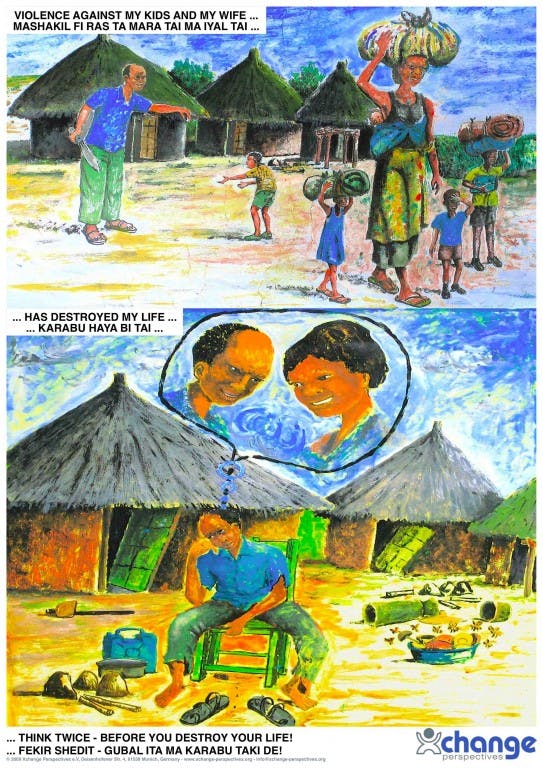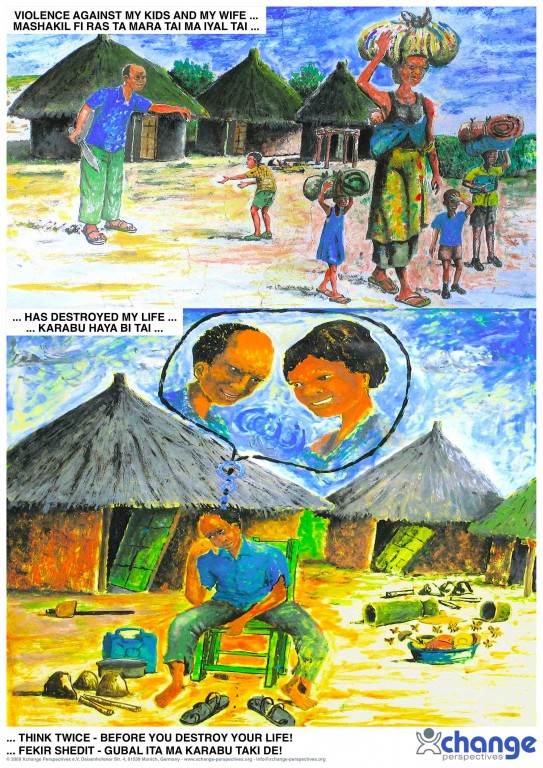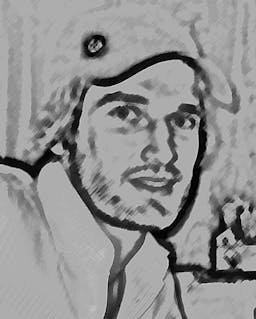A Gender For Peace
Jan 21, 2015
Story


Change has been the governing law of existence since the birth of the first cell. It is the drive of all that was, is and will be. Many cultures and spiritualities assimilate death to stillness, nothingness, in other words a state of things where change is non-existent. Human beings in their attempt to make sense of their lives and the sense behind or for their existence have made numerous attempts to understand change, describe it, categorize it, and sometimes even demonize it, as the bringer of the unknown. William Drayton said: “change starts when someone sees the next step”.
This perspective is an attempt to see beyond popular beliefs that have been directing human thought about one of humanity’s most decisive characteristics: Gender. Engendering is the set of processes through which a human being is subject to since its first contact with other human beings determining his or her later gender identity. These processes are subjective and particular to each setting and context. It has been noticeable through history that engendering has been carried out in a way leading to the suppression of one gender over the other. The popular expression weak versus strong gender streams out from this interpretation of engendering. Struggles have been fought to provide a sense of equality for women and in many regions of the world today these struggles are still being fought. The aim of this piece is to acknowledge the efforts and the results that have been achieved and attempt to provide an honest and truthful view on how to avoid the traps some countries, claiming the attainment of equality, fell into.
Women are throughout the world and to the largest extent the most vulnerable segment of society no matter how different the contexts considered are. This is particularly true if one is to take even the most superficial analysis of gender realities in countries such as Sudan, Morocco, Afghanistan to only name a few. Movements aiming at freeing women from this suffocating oppression started carefully emerging over the past decades. Female genital mutilation, denial of education, limitation of freedom of movement, forced marriages, honour killings and rape punishments, are just some of the symptoms of a deeper disease ravaging all layers of cultures of oppression. The gender discourse has been evolving in a way that tries to strip these women out of their context of oppression assimilating this process to the one carried out by western feminists. In this spirit centres of relief have been set in place in different countries to help women deal with the various consequences of any of these symptoms. This is by no means considered enough as these cultures of oppression see any gender discourse as a danger to their cultural, traditional and maybe religious heritage. A contextualization of gender discourse is crucial, if the aim is to really grant a safe and honourable living for these women, and not only imposition of foreign values to these particular settings. These dynamics of oppression are the regulators of an ‘Authoritarian Worldview’, what gives this paradigm the fuel to continue on existing through the oppression of one gender in a systemized structure leaving few possibilities for change to occur.
The redefinition of gender roles has been going through different stages and has seemingly led, in Western Europe and North America, to equal rights to fight for equality. This struggle for power permeates different layers of society and is outstanding in issues the gender discourse is concerned about, such as equal job opportunities and salaries, equal political gender representation just to mention a couple. It is impossible to deny the fact that women have obtained a high level of independence and autonomy in this environment characterized by struggle over power and have been able to draw new horizons of fulfilment that are only imagined in the authoritarian context as described earlier. The present situation of gender in this paradigm is the result of continuous struggle that started in the early sixties and has led to the acknowledgement of women’s value in the formally dominant male environments. Not taking way from the remarkable achievements of feminist movements throughout the past decades, it is important though to realize that rarely in the feminist past has there been any focus on broadening or maybe even redefining the role of men in the societies. This resulted in the spread of a feeling of helplessness and limitation as it seems that there is no uniqueness in what a man can do. One can only predict the disastrous consequences of this identity loss, as many men in these societies do not consider themselves as needed members of society anymore. If we would look closer at these societies it is clear that the feminist movement has succeeded in giving women a wide range of choices from being an independent successful single woman, with a partner, or with a more extended family. Being able to enjoy these choices is contradicted by the sense of limitation that the men in these societies suffer from. A clear example of that would be the expectation of the man to always fulfil his role of the provider for the household while the woman depending on her personal history can either choose to be financially supported or independent form her husband. This asymmetry of choices is a result of the lack of space that has been put out of focus in the current public gender discourses. Exploring the possibility of expanding the horizon of male social roles in particular is crucial for any equality to leave a firm print in gender discourses. This ‘Adversarial Worldview’ is by no means to reach equality as it only fosters a feeling of revenge psyche of the oppressed taking power over the former oppressor, maybe not in policies and specific behaviours but most definitely in the social meanings we attach to the roles played by men and women in society.
The gender narrative has centred its visions since its beginnings on the empowerment of women for more equality. Seeing equality as a relationship between two actors or more it can be by no means achieved by the empowerment of one over the other. Equality is to be fostered through an inclusive process aiming at showing the value of one another and building up a process of change for a peaceful future. Going back to the words of William Drayton, “change starts when someone sees the next step”, it is crucial to identify the next step for positive social change to occur.
A ‘Unity Based Worldview’ aiming at showing the interdependency of men and women and identifying natural differences, gender specificities, uniqueness and similarities of social roles is the way ahead for both, men and women, to expand their comfort zones in intra and inter gender relationships. Recognizing the value of the different sets of roles played by men and women and taking the stigma away from women being housewives, enlarging the possibilities of men to hold that same position without loosing their sense of masculinity is an example of how unity can beautifully work in diversity. This recognition is to go beyond what is male and what is female to focus on the value of what has been considered in the above-discussed worldviews as a sign of the oppression of women. Educating children, building up a brighter future for society is with no debate the noblest career a human being should put effort in carrying out. This life process is to lose its gender identity and is to be a shared responsibility by consent of the two parties involved. This fostering of unity and harmonization of how each gender conceives itself and the other is to build the ground for mutual fulfilments. Acknowledging the differences between men and women and internalizing the importance of these differences best shown to us in nature is crucial for this process of change to start. Nature in its wisdom has provided us with clear signs that men and women are to always be interdependent, and it is through finding harmony within this interdependence that we can find peace. The natural act of making love and creating life out of this act is the most perfect mirroring of unity in diversity, a complete inclusion creating peace.
‘Gender for Peace’ provides an alternative view on how to make sense of the popular gender narrative for futures of peace in what has been considered the longest struggle in the history of humanity. If the current gender issues are to be transformed in a way that would foster true equality, this harmony would spread to other realms of life characterized by struggle for power and inequality. It is worth mentioning that ‘Gender for Peace’ is all-inclusive as it considers equality among all genders as primordial and prerequisite to peace. This perspective could also be seen as a chance for those societies that are still stuck in the ‘Authoritarian Worldview’, to think about mechanisms to avoid falling in the chaotic situation, the adversarial societies are suffering from presently. As we continue with this reflection on gender and peace to the heights of our lateral thinking, many of us will face painful moments, as we are shaking the very fundamentals of our paradigm. Apologies, but let us be truthful and surrender our pride. And to end on a beautifully formulated image of our interconnectedness, let us listen to the words, praising ‘Tranquillity’, by Gentleman: ‘maybe you and me can live together like a melody’.
(These ideas were compiled in response to the lecture of Prof. Dorine Plantenga entitled ‘FACILITATING SOCIAL CHANGE AND TRANSFORMATION’ held from the 29th of June to the 3rd of July 2009 at the European Study Center for Peace in Stadtschlaining, Austria and serve as an invitation for further reflections on the dominant gender discourse.)
See also: http://www.generation-c.org/gender_for_peace.html
Also see Dominik Lehnert’s article: Cultural Hegemony and its Discontents http://www.generation-c.org/cultural_hegemony.html
Dominik Lehnert is from Germany. He has a MA in Peace and Conflict Studies from the European Peace University. He has previously worked with DAPP in Zambia and for the AAH-I South Sudan Programme. He is the founder of Xchange Perspectives, an organization built on the concept of 'Media for Peace'. http://www.xchange-perspectives.org - http://www.facebook.com/pages/Xchange-Perspectives/191163754595?ref=ts




